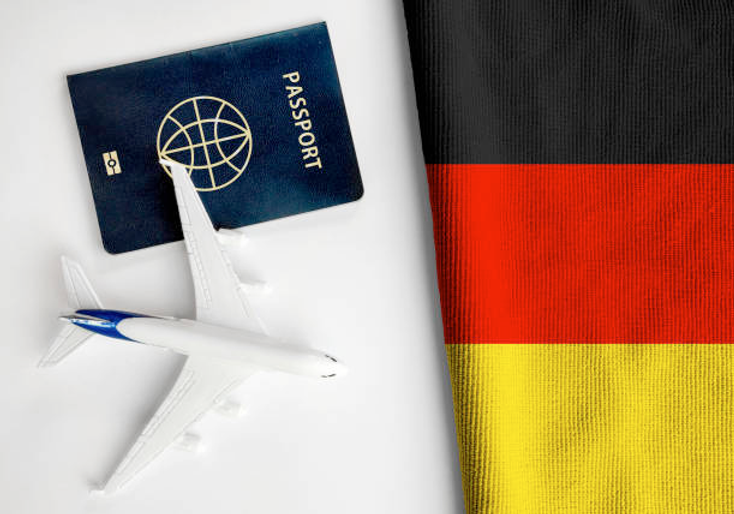In 2024, over 40,000 Indian students enrolled in German universities.
Why? Because India is known to churn out students who want to pursue fields like Engineering, Management and research oriented fields.
The problem in India, however, is the fact that even the best technical universities in India, don’t come close to the ones in Germany when it comes to Global Rankings – Technical University of Munich stands at #28 whereas IIT Bombay stands at #118 in the QS World Rankings 2025.
The number is expected to grow in 2025 due to various reasons, including no tuition fees at most public universities, world-renowned institutions, safe, student-friendly cities like Berlin and Munich among others, and most importantly, better post-study work options compared to other popular study abroad destinations.
Whether you’re applying for a bachelor’s, master’s, or research program, this blog is going to be your complete roadmap to applying for a German Student Visa in 2025.
Why Indian Students Prefer to Study in Germany
Germany offers a rare combination of affordability, quality, and future career prospects — making it a top choice for students wanting to study abroad.
Here’s Why:
1. No Tuition Fees at Public Universities
- Most public universities in Germany charge almost no tuition fees, even for international students
- You only pay a small semester fee—between €250 and €350—which includes student services and a public transport pass.
- This makes studying in Germany far more affordable than in the US, UK, or Australia.
2. Globally Ranked Universities
Germany is home to some of the best public universities in the world. These universities consistently rank in QS World Rankings and are recognised globally.
| University Name | Known For |
| TU Munich | Engineering, Computer Science, Management |
| Heidelberg University | Medicine, Life Sciences, Humanities |
| RWTH Aachen | Mechanical & Electrical Engineering |
| LMU Munich | Physics, Economics, Psychology |
| University of Freiburg | Environmental Science, Law, Philosophy |
3. Student-Friendly Environment
- Over 400,000 international students study in Germany, most of whom are Indian
- Cities like Berlin, Munich, and Frankfurt have students from across the world, making them culturally diverse and English-friendly.
Types of German Student Visas
Germany offers three main types of student visas, depending on your admission status and purpose of visit. Choosing the right one is key to a smooth entry.
1. Student Visa (Visum zu Studienzwecken)
For students who have already received unconditional admission to a German university.
- Valid for the entire duration of your degree
- Allows you to live, study, and work part-time in Germany
- Most common visa for bachelor’s and master’s applicants
2. Student Applicant Visa (Visum zur Studienbewerbung)
For students who are:
- Still waiting for university admission
- Need to appear for entrance exams or interviews
- Planning to attend a Studienkolleg (preparatory course)
Important Notes:
- Usually issued for 3–6 months
- Can be converted to a full student visa once admitted
- You cannot start your degree with this visa alone
3. Language Course Visa
If your aim is to:
- Learn German for university entry
- Improve language proficiency before formal admission
This visa:
- Is valid for up to 12 months
- Cannot be extended into a student visa (you must return and reapply after the course)

Step-by-Step Germany Student Visa Process for Indian Students
Applying for a Germany student visa in 2025 involves a series of structured steps. Start early and follow this checklist carefully.
Step 1: Get Your University Admission Letter
- Apply to public or private universities through Uni-Assist or direct portals
- Once accepted, collect your unconditional offer/admission letter
This is required before you can apply for a student visa
Step 2: Open a Blocked Account (Sperrkonto)
You must show proof of sufficient funds: minimum €11,208 per year (around ₹10 lakh).
This amount is deposited in a blocked account, which restricts withdrawals to about €934/month.
Step 3: Secure Health Insurance
- You need valid German-approved health insurance. Two options:
- Public insurance (e.g., TK, AOK) — for students under 30
- Private insurance (e.g., Mawista) — if you’re older or not eligible for public coverage
Step 4: Book Your Visa Appointment
- Schedule your appointment at the nearest VFS or German Mission
- Slots fill fast — book 2–3 months in advance
Step 5: Prepare Your Documents
Here’s a basic checklist:
- Valid passport
- Admission letter from a German university
- Blocked account confirmation
- Health insurance proof
- Academic transcripts (10th, 12th, Bachelor’s if applicable)
- Visa application form + declaration
- Language proficiency (IELTS, TestDaF, or proof of medium of instruction)
- Motivation letter
- Proof of financial resources
We’ll break this down more in the next section.
Step 6: Attend the Visa Interview
The visa interview usually happens at the German Embassy or Consulate.
Expect questions like:
- Why did you choose Germany?
- What is your course structure?
- How will you fund your education?
- Do you plan to return after studies?
Be honest — no scripted answers
Step 7: Visa Processing Timeline
- Standard processing time: 4 to 12 weeks
- Apply at least 90 days before your course starts
- Use tracking features provided by VFS or your embassy portal
Complete List of Required Documents
Having your documents ready — and in the right format — is key to a successful visa application. Here’s a detailed checklist for Indian students applying to study in Germany in 2025.
Academic & Language Documents
- Academic transcripts: 10th, 12th, Bachelor’s (if applying for PG)
- Language proficiency proof:
- IELTS (usually 6.0+), TOEFL, or
- TestDaF / DSH (if required by the university)
- Some universities accept Medium of Instruction (MOI) letters
- Motivation & Financials
- Motivation Letter / SOP
- Should explain why you chose the course, university, and your career goals
- Keep it personal, clear, and concise (1–1.5 pages)
Proof of financial resources (any one of the following):
- Blocked account
- Scholarship letter
- Sponsor’s declaration with income proof
Additional Documents (If Applicable)
- APS certificate (mandatory for students applying to public universities since 2022)
- Copies of previous visas or travel records (if you’ve been abroad)
- Accommodation proof or temporary housing reservation
Summary Table: Documents Required
| Document | Notes |
| Valid Passport | Must be valid for the full study duration (plus 6 months extra) |
| University Admission Letter | From a recognised German institution (unconditional preferred) |
| Blocked Account Confirmation | From Fintiba, Expatrio, or other approved providers |
| Health Insurance Proof | German-compliant (public or private) |
| Visa Application Form | Completed, signed, and printed from the German Missions website |
| Declaration on True Information | Must be signed and submitted along with your application |
Pro Tip:
Double-check the checklist issued by the German Mission/VFS centre you apply through. Requirements may slightly vary depending on the consulate.

Visa Tips for Indian Students
The German student visa process is thorough — but very achievable if you’re well-prepared. Here are some tips to increase your chances of success as an Indian applicant in 2025.
Choose Public Universities with High Visa Approval Rates
- Public universities are tuition-free, have clear documentation standards, and are well-recognised by embassies
- Stick to universities listed on DAAD or those requiring APS certification
Bonus: Many public universities have higher visa approval rates compared to lesser-known private ones
Write a Strong Motivation Letter
Your SOP (Statement of Purpose) or motivation letter can make or break your application
- It should reflect:
- Why you chose that university
- How the program fits your career goals
- Your ties to India and post-study intentions
- Avoid vague goals. Be specific, clear, and honest.
Can You Study in Germany Without IELTS?
Yes — in some cases.
Here’s how:
Some German universities accept a Medium of Instruction (MOI) letter from your previous institution, other universities might offer conditional admission if you enroll in a language course or pass TestDaF.
But remember that IELTS is widely accepted, not just in Germany but around the world, and is safer for visa approvals. If you do decide not to take the IELTS, make sure your university explicitly states that they don’t require it in your admission letter.
Prepare Thoroughly for the Visa Interview
Prepare answers to questions such as:
- What made you choose this program?
- Who is funding your studies?
- What will you do after graduation?
Most importantly, do not lie about anything.
Post-Study Work Opportunities in Germany
Germany offers excellent pathways for international graduates to stay, work, and even settle long-term. Understanding the right visa types post-study is crucial.
Below is a table for the most sought-after roles in Germany.
| Sector | Roles in Demand |
| IT & Software | Developers, Data Scientists, Cybersecurity |
| Engineering | Mechanical, Electrical, Civil Engineers |
| Healthcare | Doctors, Nurses, Therapists |
| Renewable Energy | Environmental Engineers, Energy Analysts |
| Business & Finance | Analysts, Consultants, Financial Planners |
Residence Permit for the Purpose of Seeking Employment After Graduation
German: Aufenthaltserlaubnis zur Arbeitsplatzsuche nach dem Studium
Key Features:
- Valid for up to 18 months
- Allows you to stay in Germany and search for a job related to your field of study
- You can take up part-time or freelance work during this period
Eligibility:
- Completed a degree from a recognised German university
- Hold valid health insurance
- Show proof of sufficient funds for the stay
- Residence Permit for Employment (After Getting a Job)
Residence Permit for Employment (After Getting a Job)
Once you land a job that matches your qualifications, you must switch to a residence permit for employment purposes.
There are two main options:
1. EU Blue Card
For highly qualified professionals in STEM, IT, healthcare, finance, etc.
Requires:
- Recognised degree
- Job offer with a minimum annual gross salary of around €45,300
- (Lower threshold — approx. €41,041 — for shortage occupations like IT, engineers, medical roles)
- Offers faster track to Permanent Residency (PR)
2. General Employment Residence Permit
- For jobs that don’t meet Blue Card salary thresholds
- Still requires a degree and job contract, but more flexible
- Slower path to PR compared to Blue Card
In both cases, your employer must issue you a job contract, which is then submitted during the visa switch application
Freelance and Startup Visas
If you’re planning to work independently:
Germany offers Freelancer Visas (Freiberufler) or Self-Employment Visas
Best suited for:
- Writers, designers, IT consultants
- Founders of startups or creative professionals
Requirements:
- Proof of qualifications
- Business plan or client contracts
- Health insurance and financial resources
- Pathway to Permanent Residency (PR)
Post-study work routes can eventually lead to long-term settlement:
- With an EU Blue Card: PR possible in 21 months (with B1 German) or 33 months (without)
- With a general employment permit: Usually 5 years of legal employment required
Post-Study Work, Useful Resources & Final Tips
Studying in Germany is more than earning a degree — it’s about building a career in one of the most innovation-driven economies in the world. Here’s what you need to know as you plan your next steps.
Useful Resources
These official platforms can help you verify requirements, stay updated, and complete your application confidently:
German Missions in India (Visa Appointments & Process)
DAAD – Scholarships & University Info
Blocked Account Providers:
- Fintiba
- Expatrio
- Coracle
Health Insurance for Students:
- Techniker Krankenkasse – TK
- AOK
- Mawista
Final Tips for Indian Students
- Start early. Some visa slots get booked 2–3 months in advance — apply as soon as you receive your admission letter.
- Have your documents ready and cross-verified. Mistakes can delay or even lead to rejections.
- Prepare for your visa interview. Be clear about your course, career goals, and financial plan.
Taksheela: Your Partner for Germany Student Visa
Need Help Applying for Your Germany Visa? Taksheela offers full visa support for Indian students, including:
- Verifying your document checklist (so you don’t miss anything)
- Filling your visa application with precision
- Booking your embassy appointment promptly
With expert guidance, you can avoid common mistakes and boost your visa success rate.
Germany is one of the few countries offering world-class education with minimal tuition costs, a welcoming post-study pathway, and strong career opportunities in tech, engineering, and beyond. With the right planning — and the right support — your study abroad dream is not just possible, it’s achievable.
Want help with your SOP or visa documentation?
Reach out to Taksheela today and take the first step toward your German education journey.
All the best!
Written By Manjul Kathotia.
